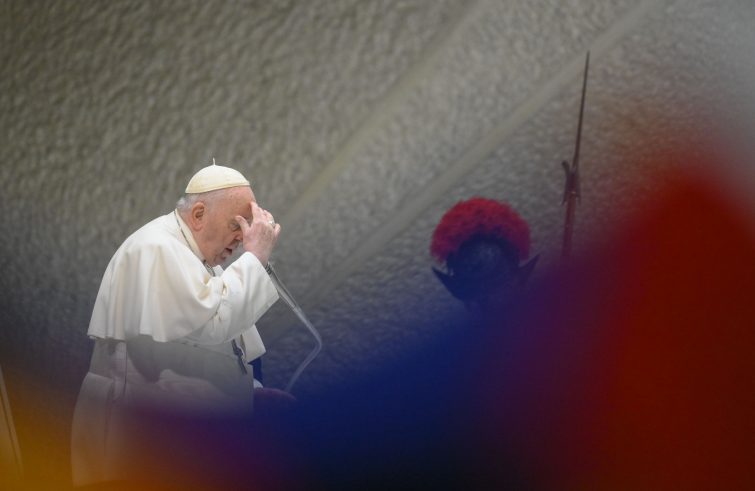
“What is built on rubble will never be a true victory.” These were the closing remarks of Pope Francis’ appeal for peace in Ukraine launched at the end of the traditional Wednesday general audience in Paul VI Hall, devoted to apostolic zeal.
“The day after tomorrow, on 24 February, it will be one year since the invasion of Ukraine, since the beginning of this absurd and cruel war. A sad anniversary!”,
the Pope said before the greetings to Italian-speaking faithful. “The toll of dead, wounded, refugees and displaced persons, destruction, economic and social damage speaks for itself. May the Lord forgive so many crimes and so much violence. He is the God of peace. Let us remain close to the tormented Ukrainian people, who continue to suffer, and let us ask ourselves: has everything possible been done to stop the war?
I appeal to those who have authority over nations to make a concrete commitment to end the conflict, to achieve a cease-fire and to start peace negotiations.
What is built on rubble will never be a true victory.”
“Everything in the Church must be conformed to the requirements of the proclamation of the Gospel; not to the opinions of the conservatives or the progressives, but to the fact that Jesus reaches people’s lives”, Francis said in the catechesis: “When decisions are found in the Church – for example ideological divisions, where is the Holy Spirit?”, Francis asked departing from the written text. “The Gospel – the Pope continued off text – is not an idea, the Gospel is not an ideology: the Gospel is a proclamation that touches your heart and makes you change your heart.
But if you take refuge in an idea, in an ideology, whether right or left or centre, you are making the Gospel a political party, an ideology, a club of people.
And how much it requires of us today to take hold of the freedom of the Gospel and allow ourselves to be carried forward by the Spirit!” “We can have well-defined times and spaces, well-organised communities, institutes and movements, but without the Spirit, everything remains soulless”, is the Pope’s counsel, along with his exhortation for the beginning of the Lenten season, to invoke the Holy Spirit often. “The organisation is not enough, it is the Spirit that gives life to the Church”, Francis said: “The Church, if it does not pray to Him and invoke Him, closes in on itself, in sterile and exhausting debates, in wearisome polarisations, while the flame of the mission is extinguished”:
“It is very sad to see the Church as if it were nothing more than a parliament”,
the Pope denounced in unscripted remarks: “the Church is something else. The Church is the community of men and women who believe and proclaim Jesus Christ, but moved by the Holy Spirit, not by their own reason. The Spirit makes us go forth, urges us to proclaim the faith in order to confirm ourselves in the faith, to go on mission to discover who we are.”
“Do not quench the Holy Spirit, either in the community or in each one of us”,
is Pope’s message for Lent. “It is undoubtedly important that in our pastoral planning we start from sociological surveys, analyses, the list of difficulties, the list of expectations and even complaints. This must be done”, Francis remarked. “However, it is far more important to start from the experiences of the Spirit: that is the real departure. And it is therefore necessary to seek them out, list them, study them, interpret them. It is a fundamental principle that, in the spiritual life, is called the primacy of consolation over desolation. First there is the Spirit who consoles, revives, enlightens, moves; then there will also be desolation, suffering, darkness, but the principle for adjusting in the darkness is the light of the Spirit.” “This is the principle to guide ourselves in things we do not understand, in confusions, even in such great darkness”, Francis assured. “Do I invoke the Spirit? Each of us can answer within ourselves”, the final invitation to the faithful: “How many of us pray to the Spirit? ‘No, Father, I pray to Our Lady, I pray to the Saints, I pray to Jesus.’ And the Holy Spirit? Don’t you pray to the Holy Spirit, who is the one who moves your heart, who brings you consolation, who brings you the desire to evangelize, undertake mission?” the question asked by the Pope and addressed to us all in this liturgical season: “Do I let myself be guided by Him, who invites me not to close in on myself but to bear Jesus, to bear witness to the primacy of God’s consolation over the desolation of the world?”.










